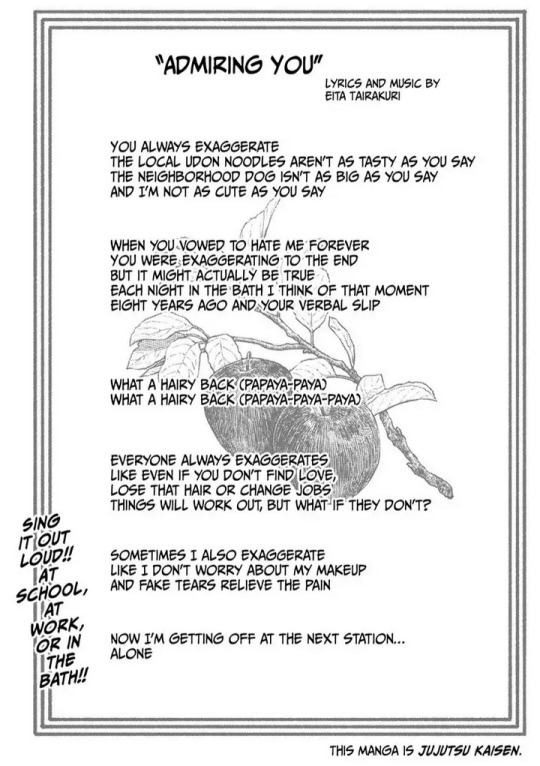#Kashimo may be one of the biggest victims of that fucking timeskip.
Text
Musing on Kashimo. I didn't originally find his character interesting, but 238 made me want to look into what Gege was going for with him. After some review, my conclusion is that he's constantly dissatisfied. Not because he's just a Fight Junkie™, but rather because if what Sukuna is saying is true (and Kashimo doesn't deny it), then Kashimo wants to treat others with care, but doesn't know how.
Fundamentally, violence can excite him (as much as it can be boring, like he implies many of his fights before Hakari were), but it can't bring him peace. Sukuna, to Kashimo, is "perfection". Why? Is it because Sukuna is unbothered? Or because Sukuna doesn't feel ill at-ease alone? Maybe it's just wanting a perfect body and a perfect soul, but given how Kashimo is looking away when Sukuna says he's greedy for being troubled by solitude when slaughtering others, I think it's deeper than that. Kashimo keeps his eyes closed, but makes what looks to be a grimace/smirk combo when Sukuna explains his own philosophy.
Using his Cursed Technique meant dying, and Kashimo used it to try and find an answer for his issues with connecting to others, and the pursuit of power. But I don't think Sukuna's answer satisfied him.
When Kashimo lived 400 years ago, he chose a path of bloodshed that left him as a small, dying man amidst carnage, with Kenjaku's words as a final temptation. In the Culling Games, Kashimo once again chose slaughter, forgoing connection, until he met Hakari and found someone he could find surprise and satisfaction (delight, even) in. In the times Hakari seemed to be perishing, Kashimo deflates, first expressing boredom, then resignation (and perhaps loss). After giving Hakari a chance to do unto Kashimo as he had done to others, Hakari chooses to make a deal with him.
The expressions Kashimo makes throughout and after the fight are quite interesting. He's drawn as if he doesn't know what to do with himself, and clings to the goal he made in the last moments we saw of his first life. He's confused at Hakari's claim of getting another to obey by being his senpai (Yuji), which he mistakes for being Sukuna's senpai. But he doesn't voice this.
Ultimately, in his third chance at discovering himself, he chooses his goal of fighting Sukuna to the death, foregoing any future chances, and leaving the connections he could have made behind. In those moments where he converses with Sukuna, my interpretation is that he regrets it. In his final death, he realizes that he'd traded away his remaining chances to connect with others, so as to allay his fears of the unknown with the familiarity of battle and imagined purpose.
It's a negative character arc, where Kashimo chooses a lie (the thrall of battle) at the expense of growth and self-fulfillment (finding companionship and learning how to care for others). I don't think it's a perfect fit, and obviously there is a silly air to it, but the theme song for "Private Pure Love Train" does describe Kashimo's mentality and character arc destination:

I didn't care much for him before, but I'd have liked to see how Kashimo fared during the timeskip. Did he stick close to Hakari, or did he coop himself up and away from others? Did he get to know Kirara or Maki? What did he think of Sukuna's former vessel, and what might interacting with Yuji have revealed about both of their characters? In the end, that possible development or regression was skipped. All I know is that Kashimo exited life's station, alone.
#Jujutsu Kaisen#JJK#JJK 238#Spoilers#Jujutsu Kaisen Spoilers#JJK Spoilers#JJK Manga Spoilers#Kashimo Hajime#Hajime Kashimo#Analysis#JJK Analysis#Kashimo fans. Please tell me your thoughts on this man.#Kashimo may be one of the biggest victims of that fucking timeskip.#What do you like about him in canon? What would you have liked to see?#This is admittedly rambly and unrefined.#Also. Kashimo would definitely relate to Radiohead's Creep. You can @ me--but you won't change my mind on that.
97 notes
·
View notes